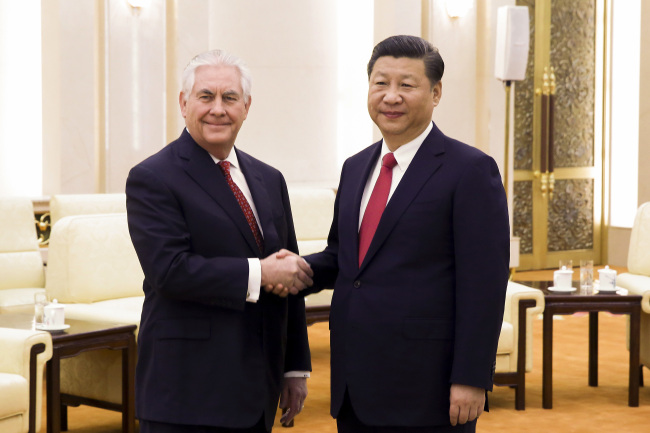US blasted China’s THAAD reaction, warned of secondary sanctions: officials
By Shin Hyon-heePublished : March 22, 2017 - 18:28
US Secretary of State Rex Tillerson raised strong objections to China’s escalating economic retaliation against South Korea over advanced missile defense assets to be deployed here during his recent visit to Beijing, a US envoy said Wednesday.
The secretary also boosted pressure on Beijing to ratchet up efforts to thwart Pyongyang’s nuclear ambitions, warning of further sanctions on Chinese businesses engaged in illicit dealings with the communist state, Seoul officials said.
The secretary also boosted pressure on Beijing to ratchet up efforts to thwart Pyongyang’s nuclear ambitions, warning of further sanctions on Chinese businesses engaged in illicit dealings with the communist state, Seoul officials said.

Tillerson met with Chinese President Xi Jinping and Foreign Minister Wang Yi last weekend as part of his Northeast Asia tour that included stops in Seoul and Tokyo.
But the secretary’s failure to address the issue of the Terminal High Altitude Area Defense system during a joint news conference Saturday with Wang prompted regrets in South Korea. At an earlier press session in Seoul with Foreign Minister Yun Byung-se, Tillerson called China’s retaliatory actions “unnecessary, inappropriate and troubling.”
Apparently mindful of the criticism, Joseph Yun, the US special representative for North Korea policy and deputy assistant secretary for Korea and Japan who accompanied Tillerson on the trip, said the secretary made “strong points” on THAAD during the closed-door meetings with Chinese officials.
“The secretary conveyed it very strongly to the Chinese side and the secretary also said in private meetings that really retaliating against a defensive system which China has done was something that was uncalled for and something of a growing concern for us. So I believe those points were well delivered by the secretary,” Yun said at the outset of talks in Seoul with his counterpart Kim Hong-kyun.
With the THAAD deployment already in motion, China has been intensifying its retaliation against South Korea across sectors from trade and retail to culture and tourism. Beijing argues the system targets it, therefore undermining its security interests.
THAAD and North Korea’s nuclear program are expected to be key features in a summit next month between Xi and US President Donald Trump. During Tillerson’s visit, the sides also discussed Washington’s ongoing North Korea policy review, Yun added.
Given persistent concerns about Beijing’s resolve to enforce sanctions against its unruly neighbor, Tillerson floated the possibility for taking what could be seen as secondary sanctions, an official at the Foreign Ministry here said.
During Yun’s separate consultations with China’s chief nuclear envoy Wu Dawei, they shared the view that now is not the time for dialogue with Pyongyang, he said, citing its sustained nuclear program and ongoing provocations.
“We’ve learned that he clearly presented the stance the US will not hesitate to sanction Chinese companies involved in illegal activities with the North, and China’s role is most important of all in the full and complete implementation of UN Security Council resolutions,” the official told reporters on background.
Ahead of the top nuclear negotiators’ meeting, Pyongyang fired an unidentified missile from the east coast in an apparent show of force but it appears to have exploded midair, the South Korean military said. Yun said the launch is “not helpful at all” and a breach of international resolutions.
The latest liftoff followed the North’s launch of four ballistic missiles early this month, and experiment of a new high-thrust rocket engine Saturday which was deemed as a step toward a test of an intercontinental ballistic missile.
In preparations for another major provocation, Kim and Yun discussed the issue of overseas North Korean laborers such as in the Middle East and Southeast Asia, as a possible item for sanctions, the ministry official said.
“The series of provocations could be seen as a prelude to an additional strategic provocation such as an ICBM test, which North Korea mentioned in its New Year speech,” the ministry here said in a statement after the talks.
“Based on this, (the two envoys) agreed to take robust punitive steps unilaterally, bilaterally and at the UNSC should the North conducts further provocations.”
During his four-day stay here, Yun visited not only Seoul diplomats but some leading presidential candidates and their aides. He met with South Chungcheong Gov. An Hee-jung and Rep. Yoo Seong-min of the Bareun Party on Tuesday, and those from the campaign of Democratic Party front-runner Moon Jae-in on Wednesday.
Despite transitional uncertainties here, Yun reaffirmed Washington’s commitment to the alliance and close policy coordination, stressing the significance of next month’s visit to Seoul by Vice President Mike Pence as the “highest level of engagement.”
“Just like we did before and after the US presidential election, I believe (Yun), too, tried to reach out to the campaigns from both sides on the sidelines of his trip to listen to their thoughts, and he knows many people here including from his previous posts,” the ministry official noted.
By Shin Hyon-hee (heeshin@heraldcorp.com)


















